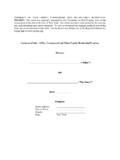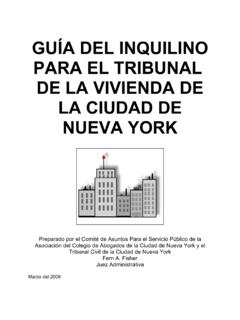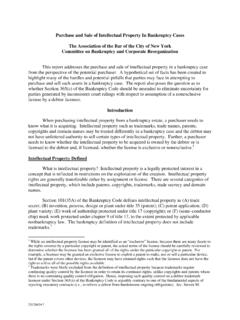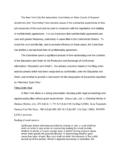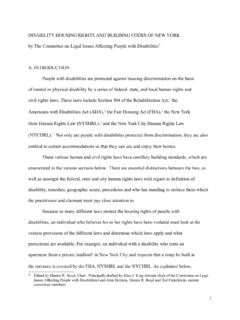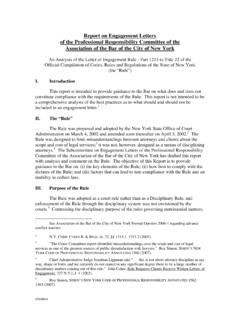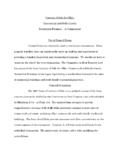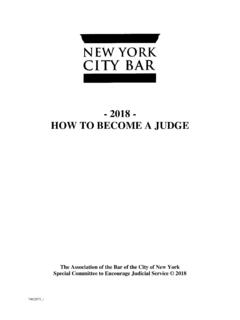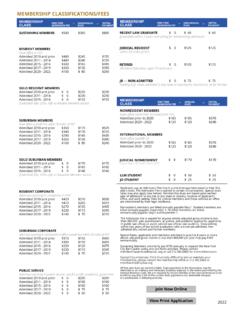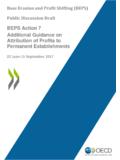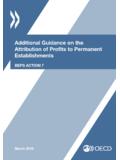Transcription of REPORT OFFERING PROPOSED GUIDANCE …
1 REPORT OFFERING PROPOSED GUIDANCE regarding THE PASSIVE FOREIGN INVESTMENT COMPANY RULES The Committee on Taxation of Business Entities September 21, 2009 Table of Contents Page I. INTRODUCTION ..- 1 - II. SUMMARY OF RECOMMENDATIONS ..- 2 - III. SUMMARY OF CURRENT LAW regarding PASSIVE FOREIGN INVESTMENT COMPANIES ..- 7 - A. Definition of a Passive Foreign Investment Company ..- 7 - B. The Once a PFIC, Always a PFIC Rule ..- 9 - C. Taxation of PFIC Shareholders under the Excess Distribution 10 - D. Indirect Ownership of PFIC Stock Through an Entity ..- 13 - E. Option 15 - F. QEF 15 - G. Mark-to-Market Regime.
2 - 18 - H. The CFC Regime and the CFC Trumps PFIC Rule ..- 19 - I. Purging Elections ..- 20 - IV. PROPOSED GUIDANCE regarding THE QEF 22 - A. QEF Election for Options ..- 22 - B. Deemed QEF Election ..- 24 - C. Requirements for a Retroactive QEF 25 - D. Financial Information Requirements for a Valid QEF Election ..- 29 - V. PROPOSED GUIDANCE regarding PFIC 31 - A. The Treatment of Cash and Non-Depreciable Assets as Passive Assets and the Start-up 31 - B. GUIDANCE regarding the Application of the Look-Through Rules with Respect to Partnerships and 25% Owned 36 - VI. PROPOSED GUIDANCE regarding THE STOCK ATTRIBUTION RULES.
3 - 41 - A. The Treatment of PFIC Shares Held Through a Foreign Trust ..- 41 - B. PROPOSED GUIDANCE regarding Tiered PFIC 52 - C. Option 69 - VII. PROPOSED GUIDANCE regarding THE APPLICATION OF SECTION 1291(E) ..- 70 - A. 70 - B. Summary of Relevant 70 - -i- Table of Contents (continued) Page C. Self-Executing Nature of Section 1291(e) ..- 74 - VIII. OTHER PROPOSED GUIDANCE ..- 76 - A. Purging Elections ..- 76 - B. GUIDANCE regarding Section 1297(d) ..- 77 - IX. 78 - -ii- This REPORT , which is submitted on behalf of the New York City Bar by its Committee on Taxation of Business Entities, proposes certain GUIDANCE regarding the passive foreign investment company ( PFIC ) Introduction This REPORT sets forth our proposals for changes to be made to the Treasury Regulations governing PFICs.
4 This REPORT is issued in part in response to a request for comments published by the Internal Revenue Service ( IRS ) in the Federal Register on August 14, PFIC rules were enacted by Congress to prevent taxpayers from avoiding or deferring (on an interest-free basis) federal income taxation on passive investments, or converting ordinary income to capital gains, by making those investments through foreign The PFIC rules, however, cast an extremely wide net, and many companies even those engaged in active businesses can easily be caught in the trap. Furthermore, the effects of the PFIC rules on taxpayers to which they apply have accurately been described as draconian.
5 4 And while certain options are available to taxpayers to escape from the PFIC regime into other regimes that are less punitive, for reasons discussed in greater detail below, those options often do not work effectively. We believe that the proposals set forth in this REPORT should be adopted by the Treasury Department and the IRS in the form of Treasury Regulations 1 This REPORT was prepared by the Committee on Taxation of Business Entities of the New York City Bar. The authors of the REPORT are Zvi Hahn, Deborah J. Goldstein, Jason Kaplan, Andrew Walker, Michael Miller and Alan J.
6 Tarr. Helpful comments were provided by Peter Blessing, Mark Stone, Mitch Weiss, John Barrie, David Franklin, Tzachi Schwartz, Rachel Ingwer and Stanley Barsky. 2 See 73 Fed. Reg. 47645 (Aug. 14, 2008). 3 See Staff of J. Comm. on Tax n, 99th Cong., General Explanation of the Tax Reform Act of 1986, at 1023 (J. Comm. Print 1987) ( Blue Book ) (noting as a reason for the change that Congress did not believe that persons who invest in passive assets should avoid the economic equivalent of current taxation merely because they invest in those assets indirectly through a foreign corporation ). 4 See, , New York State Bar Association Tax Section, REPORT on Proposals for GUIDANCE with respect to Passive Foreign Investment Companies, at 2 (May 22, 2001) ( NYSBA REPORT ).
7 In order to remove traps for the unwary, to prevent the PFIC rules from applying in certain situations in which they were never intended to apply, and generally to rationalize the PFIC rules. II. Summary of Recommendations The principal proposals made in this REPORT with respect to the PFIC rules, which, we believe, should and can be implemented by the issuance of Treasury Regulations, are summarized below: Encouraging QEF Elections A holder of an option to purchase PFIC stock should be permitted to make a qualified electing fund ( QEF ) election with respect to any PFIC shares deemed to be owned by such person under the option attribution rule of Section 1298(a)(4).
8 5 Alternatively, an exercising optionholder should be permitted to reset its holding period, thereby avoiding the once a PFIC, always a PFIC rule, by paying (with interest) the federal income tax that would have been imposed if it had made a QEF election with respect to the option for the first PFIC year. A shareholder of a PFIC should be deemed to have made a QEF election with respect to a PFIC if the shareholder can demonstrate that the PFIC has no earnings and profits for any taxable year included (in whole or in part) within his holding period. Such deemed election would remain in effect until the first taxable year (if any) in which the foreign corporation is a PFIC and has earnings and profits.
9 5 All section references are to the Internal Revenue Code of 1986, as amended (the Code ), or the regulations promulgated or PROPOSED thereunder (the Treasury Regulations ), unless otherwise indicated. - 2 - At that time, the shareholder should be permitted to decide whether or not to make a real QEF election for the PFIC. The circumstances in which retroactive QEF elections are permitted should be liberalized. At a minimum, retroactive QEF elections should be permitted in all circumstances in which the first PFIC year and all subsequent years are open (provided that the taxpayer states that it has not knowingly decided not to make a QEF election for any such applicable taxable year).
10 In addition, similar relief should be granted in circumstances in which the first PFIC year is closed, provided, however, that the shareholder would need to request a private letter ruling from the IRS and, as a condition to the receipt of such ruling, would need to enter into a closing agreement with the IRS and agree to pay an amount sufficient to eliminate any prejudice to the Treasury as a consequence of the shareholder s inability to file amended returns for closed taxable years. Small PFIC shareholders who are unable to obtain annual PFIC information statements should be permitted to make QEF elections on the basis of certain financial information reasonably available to them, such as audited financial statements of the PFIC that are either (i) required to be provided to the Securities and Exchange Commission, or (ii) used for purposes of providing reports to creditors, shareholders, or for any other substantial non-tax purpose.
